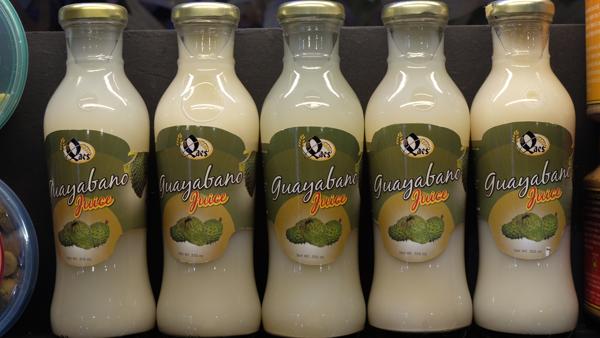Guyabano or guayabano (Annona muricata Linn.) is rich in vitamin C, phosphorus and calcium. Its 70-percent edible portion contains 63 calories and sugar content ranges from 4 to 14 percent.

It used to be an underutilized crop before it was included in the Department of Agriculture-Regional Field Office (DA-RFO) CALABARZON’s Research and Development Extension Agenda and Programs to address problems on production area, package of technology (POT), and development of value-adding technologies.
Funded by the Bureau of Agricultural Research, the Quezon Agricultural Research and Experiment Station (QARES) implemented a project aimed to develop and commercialize products from guayabano for the farmers’ associations of Dolores, and San Antonio, Quezon. “The utilization and production of A. muricata will not only provide health benefits [to the consumers] but also contribute to the economic growth of the farm household,” said Dennis DL. Bihis, project leader and science research specialist at QARES.

QARES provided a nursery for the production of guayabano seedlings for sale and distribution to the project beneficiaries and other clients of the station. Around 5, 000 seedlings from the nursery were planted at the two project sites covering a total area of 23.5 hectares.
Most of the beneficiaries own the land where these seedlings were planted. While waiting for the trees to fruit, intercrops using high-value crops will be planted to provide beneficiaries with income. Aside from this, the beneficiaries will continuously produce plantings materials for sale and/or distribution to target sites.
A component of the project is the conduct of trainings, seminars, and other capability-building activities. QARES provided the beneficiaries with hands-on experience through Structured Learning Exercises.
According to Bihis, some members were trained in plant propagation and field management to enhance their knowledge of crop production while some were trained in product development processing.
The beneficiaries of the project are the San Antonio FBS and the Rural Improvement Club of Dolores, Quezon. Members of these farmers’ associations were trained on POT of the crop and on value-adding technologies so they can continue implementing even after its completion, the technologies generated through the project.

Through the project, QARES was able to develop four products from guayabano: wine, nectar, juice, and soap.
To commercialize the guayabano products as well as the guayabano as a raw ingredient, QARES has been linking the farmers’ associations to various end-users. They have tied-up with local tourism offices as well as with the members of the Quezon Herbal Program to supply guayabano leaves for tea and other herbal concoctions.
Through the project, a Livelihood Center in San Antonio was established to display and sell the guayabano products. These guayabano products are sold at agriculture trade fairs and exhibits.
“Hopefully, we can have the commercial production started on the first quarter of 2019,” ended Bihis. ###
———-
For more information:
Dennis DL. Bihis
Project Leader
DA-RFO 4A, QARES
phone: (042) 585 7101
email: da.qaes@gmail.com
by Rena S. Hermoso, bar.gov.ph
